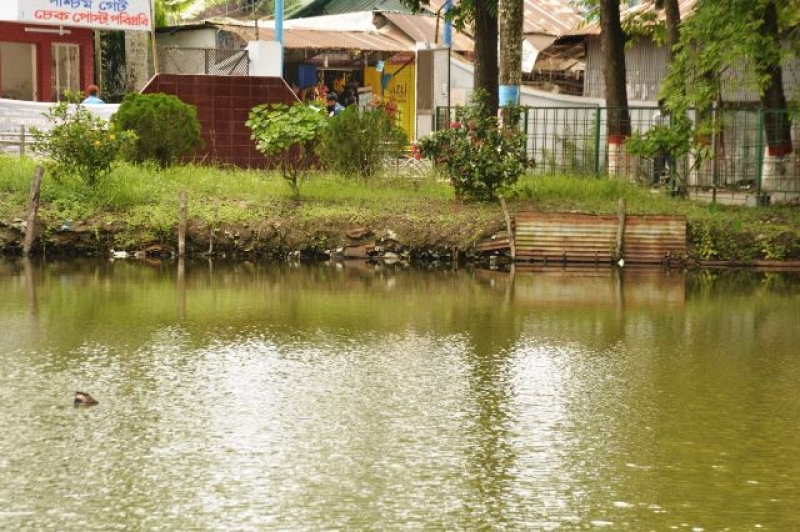- UN Calls for Calm in Bangladesh After Protest Leader’s Killing |
- DMP issues 7 traffic directives for Osman Hadi’s Janaza |
- Vested quarter fuelling chaos to impose new fascism: Fakhrul |
- Hadi’s namaz-e-janaza at 2:30pm Saturday |
- Jashore’s Gadkhali blooms with hope; flowers may fetch Tk4 bn |
PST varsity’s Lal-Neel Komol lakes degrade harming beauty

Banks of the Lal Komol and Neel Komol lakes are eroding endangering safety of their users
By Kajal Baran Das
Patuakhali, Apr 29 - The scenic and serene Lal Komol and Neel Komol lakes, long celebrated as the jewels of Patuakhali Science and Technology University (PSTU), are now teetering on the brink of environmental collapse, casting a shadow over the university’s future and threatening the delicate balance of the campus ecosystem.
Once known for their crystal-clear waters, verdant surroundings and picturesque charm, these two iconic lakes have become increasingly vulnerable to the ravages of nature.
Erosion along their banks has created perilous conditions that are not only endangering the beauty of the lakes but also jeopardising the safety of students and visitors alike.
In a region already prone to natural disasters, these environmental threats are raising alarms about the potential for devastating accidents and loss of life.
Faculty members from the university’s Faculty of Environmental Science and Disaster Management have been closely monitoring the situation and voiced grave concerns over the heavy rainfall and seasonal storms that have battered the lakes in recent times.
The damage is evident: the century-old coconut trees that once lined the shores of Lal Komol Lake now stand precariously with exposed roots, their stability in serious doubt.
The sturdy mahogany trees that have stood for over a decade are also at risk of collapse, casting a sombre reminder of the fragility of nature.
Despite the severe financial constraints that have plagued PSTU, the university administration has made it clear that environmental protection remains a top priority.
PSTU Vice-Chancellor Prof Dr Kazi Rafiqul Islam expressed his unwavering commitment to preserving the lakes, recognising their invaluable contribution to the ecological fabric of the campus. "Although the university is currently facing financial hardships, we are putting every effort into safeguarding the environment," he asserted.
"The Lal Komol and Neel Komol lakes are not just scenic landmarks; they are vital to the biodiversity of the campus and play a crucial role in regulating the local climate. We have already initiated a project to permanently protect these lakes by constructing protective pilings around them," the VC said.
In an effort to secure the necessary funds for the preservation project, the Vice-Chancellor disclosed that a special budget request has been submitted to the University Grants Commission (UGC).
“We are hopeful that the UGC will consider our proposal and allocate the required funds within this year’s budget. We are also reaching out to the media and all concerned stakeholders for support in making this initiative a reality," he said.
The lake’s delicate beauty is not only appreciated by students but also serves as a sanctuary for local wildlife and migratory birds.
Assistant Professor and Deputy Director of the University’s Development Project, Engineer Muhaiminul Alam Faiyaz, alongside his colleagues from the Faculty of Agriculture, emphasised that the lakes are a source of tranquillity and inspiration for students.
"They are an integral part of our campus, providing both a place of relaxation and a vital habitat for numerous species. If we do not act soon, the loss will be immeasurable, not just for our university, but for the entire region,” said Faiyaz.
Students, who once found solace in the lakeside’s calm embrace, now express anxiety over the deteriorating conditions. Mir Md. Nurunnabi, Afia Tahmin Jahin, and Md. Fardin Hasan, all frequent visitors to the lakes, have shared their growing concerns.
"We used to spend hours by the lake, resting on the wooden bridge or sitting on the benches," she said, adding, "But now, with the banks eroded and the trees tilting dangerously, we can’t help but feel a sense of dread. It’s no longer just a place of beauty; it’s a potential hazard," Hasan said.
Visitors to the university have also expressed their dismay. Rozina Akter, a guest from Joypurhat, reflected on the enchanting charm the lakes once offered, lamenting the visible decline.
"The lakes were a peaceful retreat, a rare escape into nature," she said. "But seeing the damaged banks and unstable trees is heartbreaking. Without prompt action, we fear an accident could not only ruin the lakes but also harm the university's reputation," she added.
The situation also casts a dark shadow over local businesses that depend on tourism. Vendors such as Md. Shahid Sardar, Saidur Rahman Khan, Riaz Kanchan, and Kamal Hossain, who rely on visitors to the lakes for their livelihoods, are now facing uncertainty.
"If tourists stop coming because of the damage, it will affect our businesses. The lakes are a significant draw for visitors, and their decline would be a blow to the local economy," said Sardar.
Experts in environmental science are unanimous in their warning: without immediate intervention, the loss of these lakes could have far-reaching consequences. Not only would the region lose a vital natural resource, but the safety of the community and the educational environment would also be at risk.
The importance of these lakes cannot be overstated—preserving them is not just an environmental necessity; it is a matter of public safety and economic stability.
As the clouds gather over the future of Lal Komol and Neel Komol lakes, one thing remains clear: time is of the essence.
The question now is whether the university, along with local authorities and the UGC, will act swiftly enough to secure the lakes' future—or whether they will fall prey to the forces of nature, lost to time and neglect. - UNB

